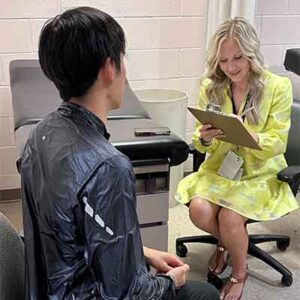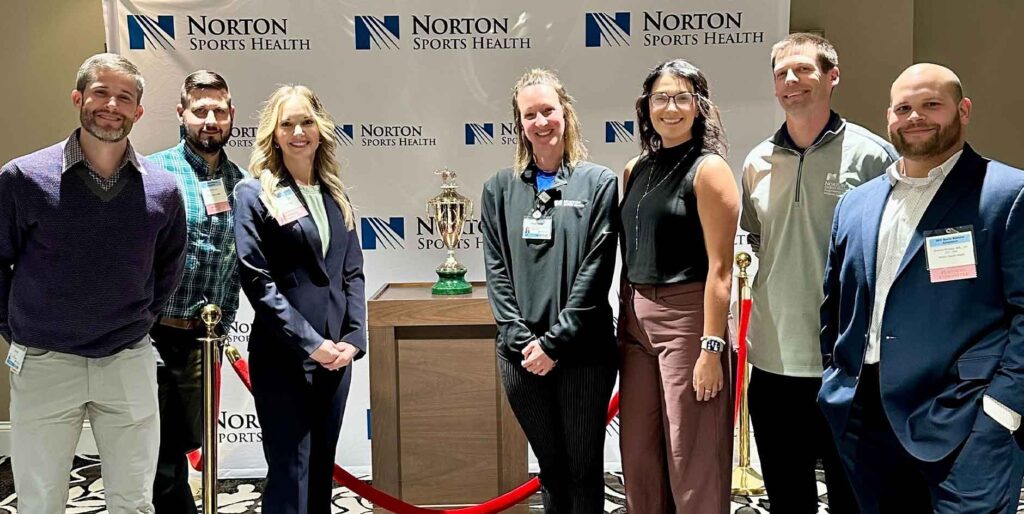Norton Sports Health provides healthcare to athletes in one of the most dangerous sports
LOUISVILLE For Tiff Haub, MS, ATC, LAT, and Nate McKinney, DO, providing care means going to the track and taking care of professional athletes in the one of the country’s more dangerous sports.
Haub, director at Norton Sports Health, and McKinney, medical director for Churchill Downs, provide medical care for jockeys and exercise riders at Churchill Downs, as well as for patrons who may have medical issues at the race track. The program helps jockeys who might not otherwise seek medical attention get the treatment that they need, as well as help them after some on-track injuries.
According to the Centers for Disease Control and Prevention (CDC), being a jockey is one of the most dangerous jobs in the country. In a report on jockeys, the CDC says that 100 jockeys have been killed on the job since 1950, and a study of injuries of licensed jockeys in the US found that more than 600 injuries are reported per every 1,000 jockey years. More than a third of those injuries occurred at and around the starting gate, another 16 percent occur during the home stretch, and 14 percent occur during the turns.
Haub says the Norton Sports Health program at Churchill Downs started in response to legislation passed to protect jockeys. The Horseracing Integrity and Safety Authority Act (HISA), passed in 2020, requires that jockeys, as professional athletes, get a sports physical and a baseline concussion test every year. In advance of the legislation going into effect in 2022, Haub says, Churchill Downs reached out to North Sports Health.
“Because we provide care to so many athletes around the area, they felt like our program and our sports medicine providers were great options to help them in accomplishing these goals and stay compliant with this new legislation,” says Haub.
HISA mandates accredited tracks have a medical director; additionally, Kentucky state law mandates that a physician and a nurse must be present at race tracks on live race days.
Norton Sports Health has medical directors or supporting sports medicine physicians at the track on all 75 race days at Churchill Downs for both spring and fall meets. Additionally, the sports medicine department provides the sports physicals and baseline concussion test for the jockeys, says Haub. Since the program started, they have been able to add healthcare for race fans on live race days as well.
The Road to Churchill Downs
For Haub, the jockey healthcare program offers her the opportunity to combine her love for horseback riding with her love of sports medicine. Haub received her bachelor’s degree in athletic training from the University of Toledo, and her post-professional master’s degree in athletic training. After working as a graduate assistant with the University of Kentucky softball program, Haub moved to the University of Louisville’s softball program and is currently pursuing a master’s degree in healthcare administration. Haub has also been an equestrian rider for some time.
At Churchill Downs, Haub and McKinney provide care to the track’s staff members. When there’s an injury, there is medical help for the riders.
“Most of the time, the rider’s injuries are very traumatic,” says Haub. “Typically, the horses are going around 40 miles per hour, so when the injury occurs, it’s almost like being in a car accident with minimal protective safety equipment.”
While riders have equipment like helmets and vest to protect them and ensure their safety, accidents still happen. When accidents occur, the majority of injuries tend to be concussions, fractures, and sprains and strains.
But because the riders are only getting paid per race, sometimes getting their injuries treated is not their priority.
“Jockeys are professional athletes, but they’re not on a team. They’re self-contracted and they’re only being compensated when they’re riding and winning,” says Haub. “Our jockeys are very transient in nature, and they’re going to ride where they’re able to pick up rides. They are more driven to return to ride, and they’re going to ride with injuries that maybe other types of athletes wouldn’t.”

management physician or primary care physician come in and talk about different substances that may be used to control weight and their effects on endurance athletes. So I think we’re just elevating what’s being offered.”
Trust before Treatment
McKinney says the jockeys he evaluates during the yearly physicals tend to have some sort of past injuries.
“I can tell you from doing a lot of the physicals that I think most of them have had a clavicle fracture at some point in their career,” he says. “Head injuries unfortunately are common, ranging from concussion all the way up to skull fractures and serious brain bleeds. Interestingly, I see more abdominal injuries in this field than compared to other sports that we think of like football and basketball.”
McKinney, a nonsurgical orthopedist, did his undergraduate work at Bellarmine University, and received his DO from Lincoln Memorial University. Now in sports medicine at Norton Orthopedic Institute, he says the new program, and the new legislation, helps the horse racing industry better monitor injuries and jockey health. But, he says, gaining the trust of jockeys is a crucial part of the program.
“When we first met the jockeys, they had reservations about us because, in their eyes, we existed solely to remove them from the sport that they get their livelihood from,” says McKinney. “If a jockey is hurt and can’t ride, he doesn’t get a paycheck. Now that I’ve been working there a couple of years, they’re familiar with my face and they’re familiar with me. There’s less hesitancy on their end to open up to me and tell me about the things that they may be dealing with.”
The goal remains to help the jockeys race safely, he says.
“My whole goal is to keep them racing, doing the sport that they love,” says McKinney. “We just want to make sure that they do it in the safest way possible.”
The Toughest Group of Athletes
When a jockey is injured on the race track, they are immediately evaluated by EMTs, says McKinney. If the EMTs determine that the injuries are severe enough, they send the jockey to the hospital. If the injuries don’t warrant a hospital visit, they get moved to the back of the track where the sports medicine professionals can evaluate them and determine how to treat them. The injuries he sees vary wildly, he says.
“I remember one of my first few races, I was there and a jockey fell off his horse early in the race,” he recalls. “He fell and was rolling around a lot, and it looked like another horse had stepped on him. I’m seeing this happen, expecting the absolute worst and the guy pops up, brushes off his chest and starts walking back over. I think that was the first time I realized he’s got the ability sometimes to land like a cat. They are the toughest group of athletes, hands down, that I’ve ever worked with.”
Other times, however, the news isn’t as good.
“Another example, was actually a jockey that I’m close with who had a scapula fracture, a shoulder blade fracture, and wanted desperately to ride in her remaining scheduled race for that day, but she couldn’t raise her arm above shoulder height,” he says. “I was really concerned about her having that fracture, and she’s the first jockey that I told that she couldn’t race. It was a hard thing for me to do. It ended up being the right policy — she did have a fracture.”
McKinney ran track at Bellarmine, so helping jockeys return to the work that they love is a constant motivation for him. “As an athlete, I know I’d lose the sense of my independence, my freedom, if I wasn’t able to perform, if pain was limiting me from doing the things that I really enjoyed,” he says. “I think that’s my motivator, to help people keep doing the things that they love to do.”
Haub says the program provides her with the opportunity to combine her sports experience with her profession.

“I have a unique background as an equestrian rider,” she says. “As someone who has sports medicine and healthcare administrative skills, I’m able to combine all three and be able to contribute. I know that this is an untapped area. I know that there’s work to be done and that I’m able to support that initiative. I’m also passionate about the horse racing community in this area. These individuals deserve a medical provider and a medical institution that’s going to help provide access and elevate the care that they’re receiving.”



